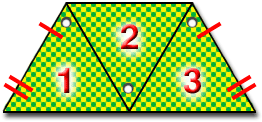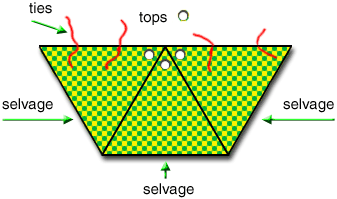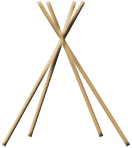

FRAME
|
1. Choose 4 pieces of 1x2 wood. They are 4 feet long. 2. Sand the pieces smooth. 3. Drill one hole in each piece all the way through the wood. Use a 1/4 inch drill bit. Drill a hole 1 inch from one end. 4. Cut a piece of cord 18 inches long. 5. Wrap some tape around the end of the cord like a shoestring. Thread it through the 4 boards. 6. Tie the thread loosely in a slip knot. |
 |
| 1. Trace around the pattern on the muslin 3 times. Mark the ( \ \\ lines for the ties and the circles ( 0) on the fabric with pencil. |  |

DECORATIONS
1. First draw some ideas for decorations on paper; choose the ones that you like. Copy your designs on the fabric.
2. Decorate the fabric with permanent markers. Write on the tent side: The Reading Tent.
3. Sign your name and date your project in one comer.
SET UP
|
1. Set up the frame by spreading the legs into a square. 2. The string that is through the boards should make a circle. Then the boards lay against one another. 3. Put the fabric over the frame and tie the 4 ties on the frame. |
 |
Behavior encouragement: (not behavior management)
1. Children will want to use the tent; be happy they want to go in and read!
2. When there is more than one child, here are some strategies for sharing. Let a child have It until he/she is finished because that encourages attention span and empathy for another child who is waiting.
3. When that doesn't work, use the clock! Give the child at least IS minutes. Other time units might be "before dinner/after dinner" or "Monday/Tuesday/ etc." Another time unit is "for the time It takes to do a special activity." You might warn the children, "I will set up the tent if you agree to give it up when I say time is up."
4. When the tent is misused, let the kids try again in an hour or a day. State the rule and don't be wishy-washy about enforcing it. They will learn and you will see the tent used often!
The Reading Tent Discussion Starter
One activity to do in the tent is obviously to read. The developmental target is to encourage children to read by giving reading a special place, one that children will love!
Fill in the two sides of a chart with other activities for which the tent might be used by brainstorming with the parents. Some global activities are listed below for the parent educator.
| Activity | Developmental Target |
| A place to read | Encouragement of reading and love of books; a special, individual place |
| A place to pretend |
Creativity and imagination Role playing Cooperative play (if child wants to) |
| A place to be alone | To focus on oneself, to think, reflect |
| A place to do homework, art activities, nap... |
Reading Tent Materials List
In the design, we have allowed for up to a 1" seam where the tent pieces are joined. Novice sewers sometimes need more fabric.
Sew the ties on with three passes as they get the most stress.
Set up tent on carpet, linoleum and wood sometimes are too slippery. If the parent has a problem, tack on Some rubbery sheet to the tent legs.
|
|
|
|||||||||
| ||||||||||